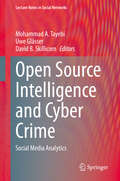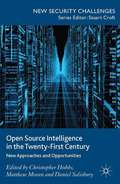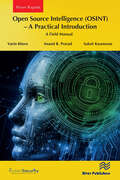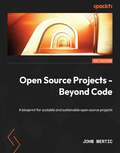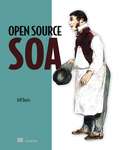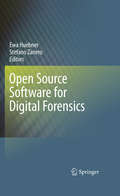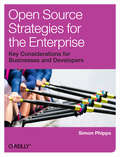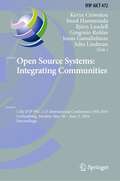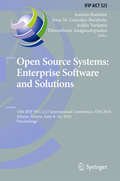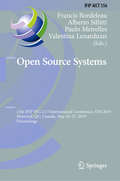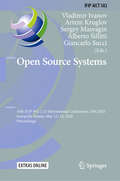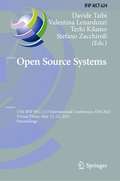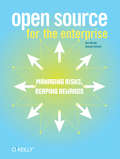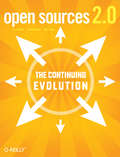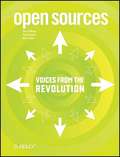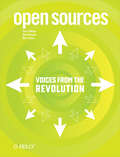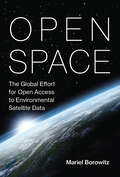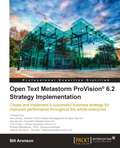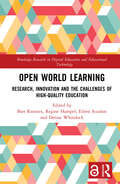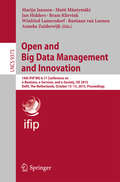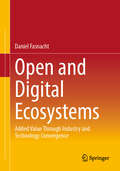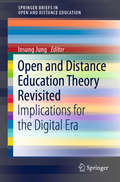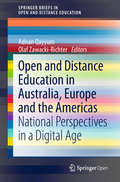- Table View
- List View
Open Source Intelligence and Cyber Crime: Social Media Analytics (Lecture Notes in Social Networks)
by Mohammad A. Tayebi Uwe Glässer David B. SkillicornThis book shows how open source intelligence can be a powerful tool for combating crime by linking local and global patterns to help understand how criminal activities are connected. Readers will encounter the latest advances in cutting-edge data mining, machine learning and predictive analytics combined with natural language processing and social network analysis to detect, disrupt, and neutralize cyber and physical threats. Chapters contain state-of-the-art social media analytics and open source intelligence research trends. This multidisciplinary volume will appeal to students, researchers, and professionals working in the fields of open source intelligence, cyber crime and social network analytics. Chapter Automated Text Analysis for Intelligence Purposes: A Psychological Operations Case Study is available open access under a Creative Commons Attribution 4.0 International License via link.springer.com.
Open Source Intelligence in the Twenty-First Century
by Christopher Hobbs Matthew Moran Daniel SalisburyThis edited book provides an insight into the new approaches, challenges and opportunities that characterise open source intelligence (OSINT) at the beginning of the twenty-first century. It does so by considering the impacts of OSINT on three important contemporary security issues: nuclear proliferation, humanitarian crises and terrorism.
Open Source Intelligence: A Field Manual (River Publishers Series in Computing and Information Science and Technology)
by Varin Khera Anand R. Prasad Suksit KwanoranThis practical book introduces open-source intelligence (OSINT) and explores how it can be executed in different intelligence scenarios. It covers varying supporting topics, such as online tracking techniques, privacy best practices for OSINT researchers, and practical examples of OSINT investigations. The book also delves into the integration of artificial intelligence (AI) and machine learning (ML) in OSINT, social media intelligence methodologies, and the unique characteristics of the surface web, deep web, and dark web.Open-source intelligence (OSINT) is a powerful tool that leverages publicly available data for security purposes. OSINT derives its value from various sources, including the internet, traditional media, academic publications, corporate papers, and geospatial information.Further topics include an examination of the dark web's uses and potential risks, an introduction to digital forensics and its methods for recovering and analyzing digital evidence, and the crucial role of OSINT in digital forensics investigations. The book concludes by addressing the legal considerations surrounding the use of the information and techniques presented.This book provides a comprehensive understanding of CTI, TI, and OSINT. It sets the stage for the best ways to leverage OSINT to support different intelligence needs to support decision-makers in today's complex IT threat landscape.
Open Source Projects - Beyond Code: A blueprint for scalable and sustainable open source projects
by John MerticAccelerate your career and make an impact by launching and running a successful open source project. Purchase of the print or Kindle book includes a free PDF eBookKey FeaturesUnderstand the method and rationale for launching an open source projectExplore best practices and insights for running an open source projectLeverage open source projects to advance your careerBook DescriptionOpen source is ubiquitous in our society, with countless existing projects, and new ones emerging every day. It follows a "scratch-your-own-itch" model where contributors and maintainers drive the project forward. Through Open Source Projects - Beyond Code, you'll learn what it takes to develop a successful, scalable, and sustainable open source project. In this book, you'll explore the full life cycle of open source projects, from inception, through launch, to maturity, and then discover how to sunset an open source project responsibly. Along the way, you'll learn the concepts of licensing, governance, community building, ecosystem management, and growing maintainers and contributors, as well as understand how other open source projects have been successful or might have struggled in some areas. You can use this book as an end-to-end guide or reference material for the future. By the end of this book, you'll be able to accelerate your career in open source. Your newly acquired skills will help you stay ahead of the curve even with the ever-evolving nature of technology.What you will learnExplore what is open source and how you can use it to accelerate your careerStart an open source project while exploring its key considerationsGrow, support, and manage a vast community of developers and usersBuild and maintain a mature and sustainable projectEnable mass users and developers to downstream productization and outreachUse open source as a portfolio to build your careerUnderstand when to end a project and conduct it responsiblyWho this book is forThis book is for software developers, product managers, project managers, business leaders, or general enthusiasts looking to start an open source project or currently maintaining one.
Open Source SOA
by Jeff DavisYou can build a world-class SOA infrastructure entirely using popular, andmature, open-source applications. Unfortunately, the technical documentationfor most open-source projects focuses on a specific product, the big SOA picture.You're left to your own devices to figure out how to cobble together a fullsolution from the various bits. In other words, unless you already know howMule and Tuscany work with jBPM, you're stuck.Open Source SOA shows readers how to build an entire SOA application usingopen-source technologies. It shows readers how to apply key ideas like EnterpriseService Bus (ESB) design and Business Process Management (BPM) and learnthe tools and techniques to implement them effectively.To pull everything together, the author describes real-life case studies from hisown work to tie together all the principles and practices. These hard-to-find casestudies are pure gold for the reader, as most developers keep these trade secretsto themselves. Purchase of the print book comes with an offer of a free PDF, ePub, and Kindle eBook from Manning. Also available is all code from the book.
Open Source Software for Digital Forensics
by Stefano Zanero Ewa HuebnerOpen Source Software for Digital Forensics is the first book dedicated to the use of FLOSS (Free Libre Open Source Software) in computer forensics. It presents the motivations for using FLOSS applications as tools for collection, preservation and analysis of digital evidence in computer and network forensics. It also covers extensively several forensic FLOSS tools, their origins and evolution. Open Source Software for Digital Forensics is based on the OSSCoNF workshop, which was held in Milan, Italy, September 2008 at the World Computing Congress, co-located with OSS 2008. This edited volume is a collection of contributions from researchers and practitioners world wide. Open Source Software for Digital Forensics is designed for advanced level students and researchers in computer science as a secondary text and reference book. Computer programmers, software developers, and digital forensics professionals will also find this book to be a valuable asset.
Open Source Strategies for the Enterprise
by Simon PhippsSo you're thinking of creating an open source community around your code? Here are some things you ought to know before you make your plans too firm.Community Types: There is no single "open source community." Rather, there are many groups of people gathered around many free software commons. Those gatherings are themselves of several different types; you really need to understand those differences.Payment at the Point of Value: Open source is of course free software. But the freedom you're finding brings you value varies depending on the role you play with respect to the software. "Free" doesn't mean the same to everyone.Open Core Is Bad For You: The "open core" business model is popular with VC-funded startup companies but does not deliver the core freedoms from which lasting business value for customers is derived.Transparency and Privacy: The key success factor in an open source community is the equality of all the participants. A strong community is characterized by high levels of transparency about the project coupled with strong respect for the privacy of the participants. Read why you should not impose your business model on anyone.
Open Source Systems: 12th IFIP WG 2.13 International Conference, OSS 2016, Gothenburg, Sweden, May 30 - June 2, 2016, Proceedings (IFIP Advances in Information and Communication Technology #472)
by Kevin Crowston Imed Hammouda Björn Lundell Gregorio Robles Jonas Gamalielsson Juho LindmanThis book constitutes the refereed proceedings of the 12th International IFIP WG 2.13 International Conference on Open Source Systems, OSS 2016, held in Gothenburg, Sweden, in May/June 2016. The 13 revised full papers presented were carefully reviewed and selected from 38 submissions. The papers cover a wide range of topics related to free, libre, and open source software, including: organizational aspects of communities; organizational adoption; participation of women; software maintenance and evolution; open standards and open data; collaboration; hybrid communities; code reviews; and certification.
Open Source Systems: 14th IFIP WG 2.13 International Conference, OSS 2018, Athens, Greece, June 8-10, 2018, Proceedings (IFIP Advances in Information and Communication Technology #525)
by Ioannis Stamelos Jesus M. Gonzalez-Barahoña Iraklis Varlamis Dimosthenis AnagnostopoulosThis book constitutes the refereed proceedings of the 14th IFIP WG 2.13 International Conference on Open Source Systems, OSS 2018, held in Athens, Greece, in June 2018.The 14 revised full papers and 2 short papers presented were carefully reviewed and selected from 38 submissions. The papers cover a wide range of topics in the field of free/libre open source software (FLOSS) and are organized in the following thematic sections: organizational aspects of OSS projects, OSS projects validity, mining OSS data, OSS in public administration, OSS governance, and OSS reusability.
Open Source Systems: 15th IFIP WG 2.13 International Conference, OSS 2019, Montreal, QC, Canada, May 26–27, 2019, Proceedings (IFIP Advances in Information and Communication Technology #556)
by Alberto Sillitti Francis Bordeleau Paulo Meirelles Valentina LenarduzziThis open access book constitutes the refereed proceedings of the 15th IFIP WG 2.13 International Conference on Open Source Systems, OSS 2019, held in Montreal, Quebec, Canada, in May 2019.The 10 revised full papers and 5 short papers presented were carefully reviewed and selected from 35 submissions. The papers cover a wide range of topics in the field of free/libre open source software (FLOSS) and are organized in the following thematic sections: mining OSS data; organizational aspects of FLOSS projects; FLOSS adoption; FLOSS cost and licenses; and FLOSS education and training.
Open Source Systems: 16th IFIP WG 2.13 International Conference, OSS 2020, Innopolis, Russia, May 12–14, 2020, Proceedings (IFIP Advances in Information and Communication Technology #582)
by Giancarlo Succi Alberto Sillitti Vladimir Ivanov Artem Kruglov Sergey MasyaginThis book constitutes the refereed proceedings of the 16th IFIP WG 2.13 International Conference on Open Source Systems, OSS 2020, held in Innopolis, Russia, in May 2020.* The 12 revised full papers and 8 short papers presented were carefully reviewed and selected from 42 submissions. The papers cover a wide range of topics in the field of free/libre open source software (FLOSS) and discuss theories, practices, experiences, and tools on development and applications of OSS systems, with a specific focus on two aspects:(a) the development of open source systems and the underlying technical, social, and economic issue, (b) the adoption of OSS solutions and the implications of such adoption both in the public and in the private sector.*Due to the COVID-19 pandemic, the conference was held virtually.
Open Source Systems: 17th IFIP WG 2.13 International Conference, OSS 2021, Virtual Event, May 12–13, 2021, Proceedings (IFIP Advances in Information and Communication Technology #624)
by Stefano Zacchiroli Valentina Lenarduzzi Davide Taibi Terhi KilamoThis book constitutes the refereed proceedings of the 17th IFIP WG 2.13 International Conference on Open Source Systems, OSS 2021, held virtually in May 2021.The 4 full papers and 3 short papers presented were carefully reviewed and selected from 23 submissions. The papers cover a wide range of topics in the field of free/libre open source software (FLOSS) and discuss theories, practices, experiences, and tools on development and applications of OSS systems, with a specific focus on two aspects:(a) the development of open source systems and the underlying technical, social, and economic issue, (b) the adoption of OSS solutions and the implications of such adoption both in the public and in the private sector.
Open Source Systems: Integrating Communities
by Kevin Crowston Imed Hammouda Björn Lundell Gregorio Robles Jonas Gamalielsson Juho LindmanThis book constitutes the refereed proceedings of the 12th International IFIP WG 2. 13 International Conference on Open Source Systems, OSS 2016, held in Gothenburg, Sweden, in May/June 2016. The 13 revised full papers presented were carefully reviewed and selected from 38 submissions. The papers cover a wide range of topics related to free, libre, and open source software, including: organizational aspects of communities; organizational adoption; participation of women; software maintenance and evolution; open standards and open data; collaboration; hybrid communities; code reviews; and certification.
Open Source for the Enterprise: Managing Risks, Reaping Rewards
by Gautam Guliani Dan WoodsThis book provides something far more valuable than either the cheerleading or the fear-mongering one hears about open source. The authors are Dan Woods, former CTO of TheStreet.com and a consultant and author of several books about IT, and Gautam Guliani, Director of Software Architecture at Kaplan Test Prep & Admissions. Each has used open source software for some 15 years at IT departments large and small. They have collected the wisdom of a host of experts from IT departments, open source communities, and software companies. Open Source for the Enterprise provides a top to bottom view not only of the technology, but of the skills required to manage it and the organizational issues that must be addressed.
Open Sources 2.0: The Continuing Evolution
by Mark Stone Danese Cooper Chris DiBonaOpen Sources 2.0 is a collection of insightful and thought-provoking essays from today's technology leaders that continues painting the evolutionary picture that developed in the 1999 book Open Sources: Voices from the Revolution .These essays explore open source's impact on the software industry and reveal how open source concepts are infiltrating other areas of commerce and society. The essays appeal to a broad audience: the software developer will find thoughtful reflections on practices and methodology from leading open source developers like Jeremy Allison and Ben Laurie, while the business executive will find analyses of business strategies from the likes of Sleepycat co-founder and CEO Michael Olson and Open Source Business Conference founder Matt Asay.From China, Europe, India, and Brazil we get essays that describe the developing world's efforts to join the technology forefront and use open source to take control of its high tech destiny. For anyone with a strong interest in technology trends, these essays are a must-read.The enduring significance of open source goes well beyond high technology, however. At the heart of the new paradigm is network-enabled distributed collaboration: the growing impact of this model on all forms of online collaboration is fundamentally challenging our modern notion of community.What does the future hold? Veteran open source commentators Tim O'Reilly and Doc Searls offer their perspectives, as do leading open source scholars Steven Weber and Sonali Shah. Andrew Hessel traces the migration of open source ideas from computer technology to biotechnology, and Wikipedia co-founder Larry Sanger and Slashdot co-founder Jeff Bates provide frontline views of functioning, flourishing online collaborative communities.The power of collaboration, enabled by the internet and open source software, is changing the world in ways we can only begin to imagine.Open Sources 2.0 further develops the evolutionary picture that emerged in the original Open Sources and expounds on the transformative open source philosophy."This is a wonderful collection of thoughts and examples bygreat minds from the free software movement, and is a must have foranyone who follows free software development and project histories."--Robin Monks, Free Software MagazineThe list of contributors includeAlolita SharmaAndrew HesselBen LaurieBoon-Lock YeoBruno SouzaChris DiBonaDanese CooperDoc SearlsEugene KimGregorio RoblesIan MurdockJeff BatesJeremy AllisonJesus M. Gonzalez-BarahonaKim PoleseLarry SangerLouisa LiuMark StoneMark StoneMatthew N. AsayMichael OlsonMitchell BakerPamela JonesRobert AdkinsRuss NelsonSonali K. ShahStephen R. WalliSteven WeberSunil SaxenaTim O'ReillyWendy Seltzer
Open Sources: Voices from the Open Source Revolution
by Tim O'Reilly Larry Wall Eric S. Raymond Chris Dibona Mark Stone Sam Ockman Open Source Organization Brian Behlendorf Scott Bradner Jim Hamerly Kirk Mckusick Tom Paquin Bruce Perens Richard Stallman Michael Tiemann Linus Torvalds Paul Vixie Bob YoungThrough essays that explain how the movement works, why it succeeds, and where it is going. A powerful vision from the movement's spiritual leaders, this book reveals the mysteries of how open development builds better software and how businesses can leverage freely available software for a competitive business advantage.
Open Sources: Voices from the Open Source Revolution
by Sam Ockman Chris DiBonaFreely available source code, with contributions from thousands of programmers around the world: this is the spirit of the software revolution known as Open Source. Open Source has grabbed the computer industry's attention. Netscape has opened the source code to Mozilla; IBM supports Apache; major database vendors haved ported their products to Linux. As enterprises realize the power of the open-source development model, Open Source is becoming a viable mainstream alternative to commercial software.Now in Open Sources, leaders of Open Source come together for the first time to discuss the new vision of the software industry they have created. The essays in this volume offer insight into how the Open Source movement works, why it succeeds, and where it is going.For programmers who have labored on open-source projects, Open Sources is the new gospel: a powerful vision from the movement's spiritual leaders. For businesses integrating open-source software into their enterprise, Open Sources reveals the mysteries of how open development builds better software, and how businesses can leverage freely available software for a competitive business advantage.The contributors here have been the leaders in the open-source arena:Brian Behlendorf (Apache)Kirk McKusick (Berkeley Unix)Tim O'Reilly (Publisher, O'Reilly & Associates)Bruce Perens (Debian Project, Open Source Initiative)Tom Paquin and Jim Hamerly (mozilla.org, Netscape)Eric Raymond (Open Source Initiative)Richard Stallman (GNU, Free Software Foundation, Emacs)Michael Tiemann (Cygnus Solutions)Linus Torvalds (Linux)Paul Vixie (Bind)Larry Wall (Perl)This book explains why the majority of the Internet's servers use open- source technologies for everything from the operating system to Web serving and email. Key technology products developed with open-source software have overtaken and surpassed the commercial efforts of billion dollar companies like Microsoft and IBM to dominate software markets. Learn the inside story of what led Netscape to decide to release its source code using the open-source mode. Learn how Cygnus Solutions builds the world's best compilers by sharing the source code. Learn why venture capitalists are eagerly watching Red Hat Software, a company that gives its key product -- Linux -- away.For the first time in print, this book presents the story of the open- source phenomenon told by the people who created this movement.Open Sources will bring you into the world of free software and show you the revolution.
Open Space: The Global Effort for Open Access to Environmental Satellite Data (Information Policy)
by Mariel BorowitzAn examination of environmental satellite data sharing policies, offering a model of data-sharing policy development, case and practical recommendations for increasing global data sharing.Key to understanding and addressing climate change is continuous and precise monitoring of environmental conditions. Satellites play an important role in collecting climate data, offering comprehensive global coverage that can't be matched by in situ observation. And yet, as Mariel Borowitz shows in this book, much satellite data is not freely available but restricted; this remains true despite the data-sharing advocacy of international organizations and a global open data movement. Borowitz examines policies governing the sharing of environmental satellite data, offering a model of data-sharing policy development and applying it in case studies from the United States, Europe, and Japan—countries responsible for nearly half of the unclassified government Earth observation satellites. Borowitz develops a model that centers on the government agency as the primary actor while taking into account the roles of such outside actors as other government officials and non-governmental actors, as well as the economic, security, and normative attributes of the data itself. The case studies include the U.S. National Aeronautics and Space Administration (NASA) and the U.S. National Oceanographic and Atmospheric Association (NOAA), and the United States Geological Survey (USGS); the European Space Agency (ESA) and the European Organization for the Exploitation of Meteorological Satellites (EUMETSAT); and the Japanese Aerospace Exploration Agency (JAXA) and the Japanese Meteorological Agency (JMA). Finally, she considers the policy implications of her findings for the future and provides recommendations on how to increase global sharing of satellite data.
Open Standards and the Digital Age
by Andrew L. RussellHow did openness become a foundational value for the networks of the twenty-first century? Open Standards and the Digital Age answers this question through an interdisciplinary history of information networks that pays close attention to the politics of standardization. For much of the twentieth century, information networks such as the monopoly Bell System and the American military's Arpanet were closed systems subject to centralized control. In the 1970s and 1980s, however, engineers in the United States and Europe experimented with design strategies to create new digital networks. In the process, they embraced discourses of "openness" to describe their ideological commitments to entrepreneurship, technological innovation, and participatory democracy. The rhetoric of openness has flourished - for example, in movements for open government, open source software, and open access publishing - but such rhetoric also obscures the ways the Internet and other "open" systems still depend heavily on hierarchical forms of control.
Open Text Metastorm ProVision® 6.2 Strategy Implementation
by Bill AronsonThis is both a practical and theoretical guide detailing how to deploy a successful ProVision® strategy, using a number of real business cases along the way. Unlike other architecture books, the approach is holistic - it looks at the whole lifecycle of building a business case, through to using the product. It combines a detailed understanding of the ProVision® toolset with a practical grasp of the business issues that affect the implementation of a successful strategy.If you are a business architect or CIO in a large organization who wants to implement a successful strategy using Open Text ProVision®, then this book is for you. It will also be of interest if you are an enterprise designer or architect. It might be that you already have working knowledge of ProVision®, but do not yet have the skill to implement it in the right context; this book will help you get there.
Open World Learning: Research, Innovation and the Challenges of High-Quality Education (Routledge Research in Digital Education and Educational Technology)
by Regine Hampel Eileen Scanlon Bart Rienties Denise WhitelockThis book provides state-of-the-art contemporary research insights into key applications and processes in open world learning. Open world learning seeks to understand access to education, structures, and the presence of dialogue and support systems. It explores how the application of open world and educational technologies can be used to create opportunities for open and high-quality education. Presenting ground-breaking research from an award winning Leverhulme doctoral training programme, the book provides several integrated and cohesive perspectives of the affordances and limitations of open world learning. The chapters feature a wide range of open world learning topics, ranging from theoretical and methodological discussions to empirical demonstrations of how open world learning can be effectively implemented, evaluated, and used to inform theory and practice. The book brings together a range of innovative uses of technology and practice in open world learning from 387,134 learners and educators learning and working in 136 unique learning contexts across the globe and considers the enablers and disablers of openness in learning, ethical and privacy implications, and how open world learning can be used to foster inclusive approaches to learning across educational sectors, disciplines and countries. The book is unique in exploring the complex, contradictory and multi-disciplinary nature of open world learning at an international level and will be of great interest to academics, researchers, professionals, and policy makers in the field of education technology, e-learning and digital education.
Open and Big Data Management and Innovation
by Marijn Janssen Bram Klievink Matti Mäntymäki Jan Hidders Winfried Lamersdorf Bastiaan Van Loenen Anneke ZuiderwijkThis book constitutes the refereed conference proceedings of the 14th IFIP WG 6. 11 Conference on e-Business, e-Services and e-Society, I3E 2015, held in Delft, The Netherlands, in October 2015. The 40 revised full papers presented together with 1 keynote panel were carefully reviewed and selected from 65 submissions. They are organized in the following topical sections: adoption; big and open data; e-business, e-services,, and e-society; and witness workshop.
Open and Digital Ecosystems: Added Value Through Industry and Technology Convergence
by Daniel FasnachtDive into the fascinating world of digital disruption and discover the transformative power of open and digital ecosystems, which will constitute one-third of global trade by 2030. This book demonstrates how value creation occurs beyond organizational boundaries and places the consumer at the forefront. The convergence of industries and technologies drives the experience-oriented customer journey and accelerates digital transformation. Explore Artificial Intelligence, Augmented Reality, the Internet of Things, Blockchain, Cloud, and Quantum Computing as key building blocks for innovation. The golden triangle of digital ecosystems - commerce, social media, and finance – illustrates how companies like Alibaba, Tencent, NIO, Alphabet, Apple, Amazon, and Migros create unique customer experiences and integrate services with super-apps. Through in-depth analyses and practical case studies, you will learn how companies can thrive in this revolutionary model, achieving growth by sharing knowledge and resources, responding swiftly to market changes, and balancing the optimization of existing businesses with the exploration of new opportunities. Leadership in open and digital ecosystems demands a shift in mindset and the development of new dynamic capabilities. Emphasizing openness, agility, and ambidexterity as critical skills, this book is an indispensable guide for companies aiming to leverage open and digital ecosystems for sustainable growth and to build agile, resilient organizations. Gain a modern understanding of leadership and discover how it shapes the future of work in the era of digital ecosystems.
Open and Distance Education Theory Revisited: Implications for the Digital Era (SpringerBriefs in Education)
by Insung JungThis book explores foundational theories that have been applied in open and distance education (ODE) research and refined to reflect advances in research and practice. In addition, it develops new theories emerging from recent developments in ODE. The book provides a unique and up-to-date source of information for ODE scholars and graduate students, enabling them to make sense of essential theory, research and practice in their field, and to comprehend the gaps in, and need for further enquiry into, theoretical approaches in the digital era. It also offers theory-based advice and guidelines for practitioners, helping them make and justify decisions and actions concerning the development, implementation, research and evaluation of ODE.
Open and Distance Education in Australia, Europe and the Americas: National Perspectives in a Digital Age (SpringerBriefs in Education)
by Olaf Zawacki-Richter Adnan QayyumThis book is open access under a CC BY 4.0 license.This book describes the history, structure and institutions of open and distance education in six countries: Australia, Brazil, Canada, Germany, the UK and the US. It discusses how open and distance education is evolving in a digital age to reflect the needs and circumstances of national higher education systems in these countries, and explores the similarities and differences between the ways in which they are organized and structured. It is the first book to make such comparisons and draw conclusions about the nature of open and distance education in the context of various national higher education systems. In a digital era with growing use of online education as well as open and distance education, this book is particularly useful for policy-makers and senior administrators who want to learn about organizing and expanding open and distance education provision. It is also a valuable reference for researchers, academics and students interested in understanding the different approaches to open and distance education.
